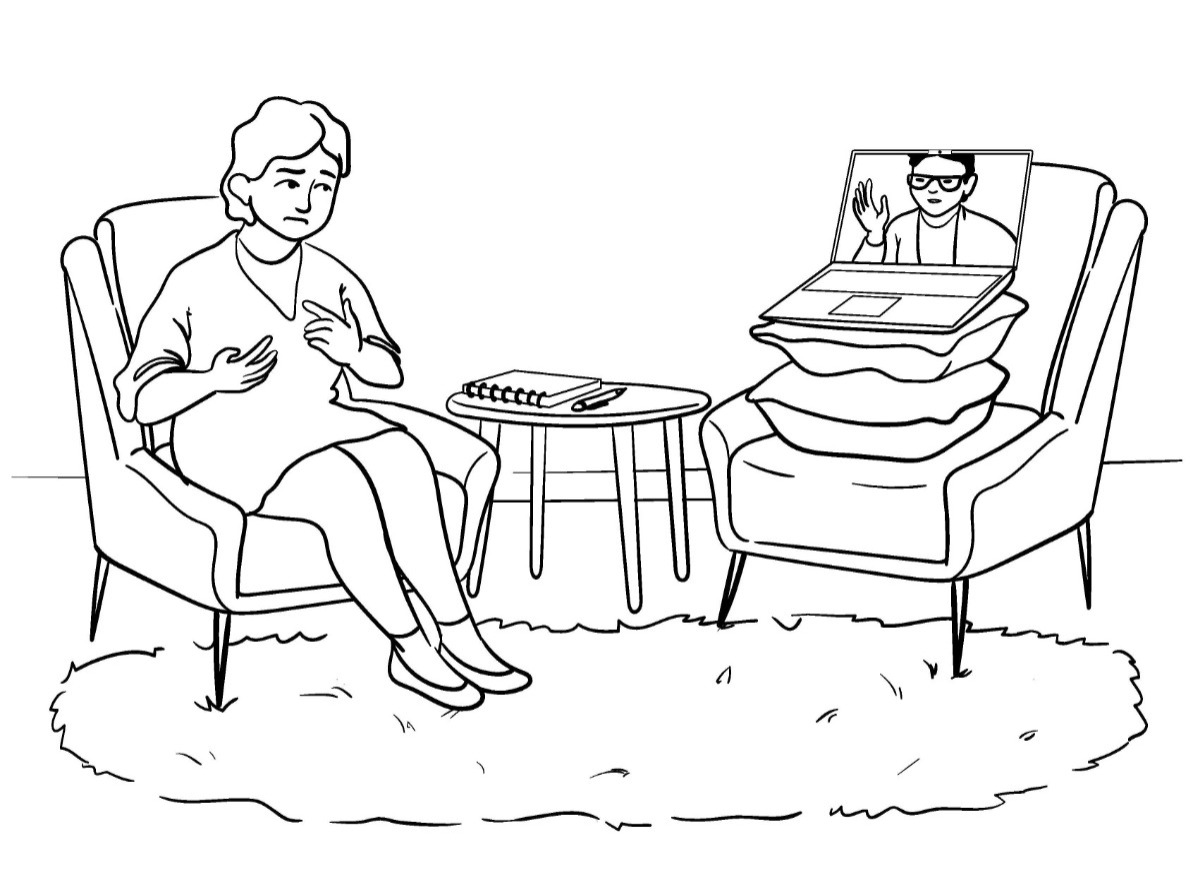A Guide to Online Counselling in Australia
Online Therapy
There are more than 400 Psychotherapists and Counsellors listed in Good Therapy Australia’s Practitioner Directory who provide telehealth services via phone and/or online video platforms such as Coviu, Skype or Zoom.
Online therapy is psychotherapy or counselling that is conducted through an Internet-based platform.
Online therapy involves interaction between a therapist and client that:
With over 88% of Australians using the Internet regularly, and 83% owning smartphones, it’s not surprising that online counselling and therapy is increasingly popular.
Research confirms that online counselling can be an effective alternative or supplement to more traditional face to-face and in-person therapeutic methods, or telephone counselling (Barak et al., 2008; Richards and Vigano, 2013).
Unlike in-person counselling, men are just as likely as women to view online therapy positively. While we think of younger people as "digital natives" attuned to all things online, older people are just as likely to benefit from e-therapies as younger cohorts (Richards and Vigano, 2013).

Research conducted with users of internet-based counselling and psychotherapy has also confirmed its advantages for people engaging in therapy. These include accessibility; flexibility; increased choice; and anonymity.

From smartphones to tablets, PCs to iPads, online counselling can be accessed easily with the technological tools many people use on a daily basis. The nature of online therapy means it can be incorporated in a wide range of formats, ranging from video-based technology such as Skype or FaceTime, to group messenger modes like Slack or WhatsApp.
Online technology enables point-in-time contact between a therapist and a client, which can help people overcome barriers like distance and transport to gain access to a practitioner. This makes online counselling a convenient, accessible option for people who live in remote and regional parts of Australia, or who lack private transportation options.
Everyone who seeks therapy should have the opportunity to participate on an equitable basis. Online counselling is a convenient, cost-effective option that can facilitate a meaningful one-on-one therapeutic relationship without the need for ongoing face-to-face meetings between practitioner and client. This means that online therapy offers much-needed flexibility for people who may find it challenging to physically travel to consultations - for example, people with disability or illness, people experiencing severe anxiety; as well as shift workers unable to attend traditional 9am - 5pm appointments.
The immediacy of web-based therapy makes it a valid option for people looking for immediate access to a psychotherapist, particularly if an issue has suddenly arisen in their life.


Australians in rural and regional areas may lack access to the range and type of therapeutic options available to people in metropolitan locations. For those facing the barriers of distance or limited local service delivery, online therapy can be a gift. Think of the 240 therapists in Good Therapy’s directory who make their skills accessible online. This spectrum of expertise opens up enormous possibilities for people all across Australia ? not only in terms of a broader choice of practitioners, but also providing a more diverse range of therapeutic modalities to explore.
Online therapy also gives people additional options that can complement any face-to-face therapy they are currently engaging in. Practitioners may draw on digital technology as part of their therapeutic practice with a client, for example through using Skype sessions or emails in between face-to-face sessions. Clients unable to attend an appointment with their regular therapist may value the alternative of participating in a web- or Messenger-based consultation offered by another practitioner recommended by their provider.
The anonymity of cyberspace can open the doors to therapy for some. The decision to engage with psychotherapy is a highly individual one that people make on their own terms, and in their own time-frames. For some people, an anonymous webchat may be a powerful medium for them to "break the ice" in their journey towards healing and self-empowerment.
For younger generations including millennials who have grown up with the Internet and smartphones as part of the fabric of their daily lives, accessing therapy through an online service may feel entirely natural. Regardless of age or digital literacy, there will be many people who are attracted to the privacy and anonymity afforded by the online medium, particularly in their initial exploration of therapy.

Research indicates that online psychotherapy and counselling can lead to positive outcomes, but there are questions to ask when considering whether it is right for you.
For some people, in-person interaction will be preferable to virtual or video-based communication. Body language, tone of voice, micro-expressions all play a role in building rapport and trust in the therapeutic relationship. These can be conveyed in a Skype session, but less so in web chat or on email. For some, the immediacy and intimacy of the in-person dynamic will always work better for them.
For others, in particular people with a more introverted personality orientation or physical barriers to face-to-face therapeutic engagement, online therapy will be an ideal solution. The format may be experienced as non-confrontational, even essential for people experiencing anxiety. Some people will be more comfortable expressing themselves in writing than verbally, so emails or online messaging will be a medium they engage readily with. Writing itself has therapeutic benefits, which may be brought to life by a text-based email or web counselling option.
Some online counselling services are provided free of charge, either because they are subsidised by government agencies or staffed by community volunteers. It is important to be aware of the terms on which services are delivered, and the qualifications or training of those providing services through the website you are accessing.
Australian therapists operate within legislative and professional frameworks that safeguard clients’ confidentiality and privacy. However, as with all online services, people engaging with web-based therapy should be conscious of personal safety and security. Users should take the normal security precautions around personal information, passwords and virus protection. Practitioners should provide clients with appropriate information and consent forms regarding how personal information is used or stored, just as they would if clients were attending a face-to-face appointment. Financial transactions should be treated with the same precautions as other online payments.
There are practical considerations as well when it comes to digital technology and therapy: the need for a secure and reliable Internet connection; computer literacy and language skills; enough personal space and privacy at home or another location to engage in an online or video session.

Persons experiencing serious or complex mental health issues are urged to consult their GP for guidance on what is the best way forward in view of their particular needs.
In an emergency, please call 000.
Sources: Barak, A., Hen, L., Boniel-Nissim, M. & Shapira, N. (2008), A Comprehensive Review and a Meta-Analysis of the Effectiveness of Internet-Based Psychotherapeutic Interventions. Journal of Technology in Human Services, (26, 2-4), 109-160; Richards, D. & Vigan, N. (2013). Online Counseling: A Narrative and Critical Review of the Literature. Journal of Clinical Psychology, 69(9), 994-1011.